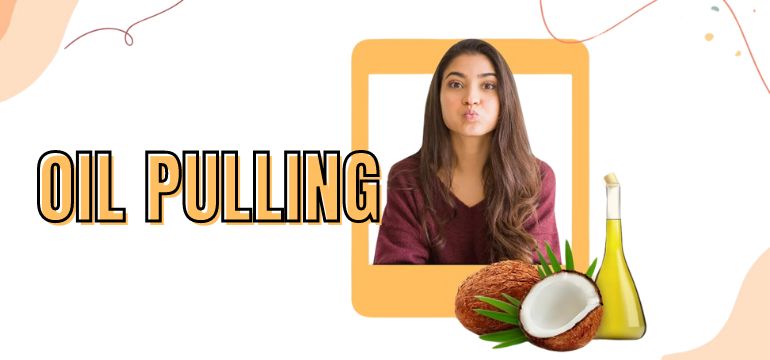Oil Pulling- A Fad or Fab?
Oil pulling is an ancient Ayurvedic practice originating from India that involves swishing oil, mostly coconut oil, around in the mouth for a period of time, typically 15-20 minutes. Many people claim multiple oral health benefits, but how does this seemingly simple practice actually work to benefit oral health?
Oil pulling is an ancient practice with roots that stretch back thousands of years, yet it still holds relevance in today's world. Picture yourself transported to ancient civilizations, where oral health wasn't just about keeping a bright smile but was intricately tied to overall well-being.
Let's explore the fascinating history of oil pulling, uncover its traditional roots, and discover why it continues to capture the attention of health-conscious individuals around the globe.
Does this time-honored practice really hold the secrets for maintaining healthy teeth and gums in the 21st century?
When you swish oil around in your mouth, it mixes with saliva and starts to penetrate into the tiny crevices between your teeth and gums. This action is believed to help "pull out" or attract bacteria, toxins, and other debris from these hard-to-reach areas.
One of the key aspects of how oil pulling works lies in the chemical properties of the oil itself. The lipids in the oil are thought to have an affinity for the fatty cell membranes of bacteria present in the mouth.
As you swish the oil around, these lipids bind to the bacteria, effectively encapsulating them within the oil. When you eventually spit out the oil, you're also spitting out these bacteria, along with any other impurities they may have been harboring.
Moreover, certain oils used in oil pulling, such as coconut oil and sesame oil, contain antimicrobial properties. These properties can help to further inhibit the growth of bacteria in the mouth, contributing to a healthier oral environment.
Additionally, the act of swishing oil around in the mouth stimulates saliva production. Saliva plays a crucial role in maintaining oral health by helping to rinse away food particles, bacteria, and acids that can contribute to tooth decay and gum disease.
Overall, oil pulling works through a combination of physical and chemical mechanisms to help remove bacteria, toxins, and impurities from the mouth, ultimately promoting cleaner teeth and healthier gums. While more research is needed to fully understand the extent of its benefits, many individuals report positive results from incorporating oil pulling into their oral hygiene routines.
Is Oil Pulling Good for Teeth?
Absolutely! Oil pulling is a practice that has been around for centuries and is often touted as a natural way to promote oral health. Some people swear by it, claiming it leaves their teeth feeling cleaner and their gums healthier.
While there is anecdotal evidence to support its benefits, like reducing plaque and improving gum health, the scientific community is still divided on its effectiveness compared to traditional oral hygiene methods.
So, while oil pulling might be worth a try for some, it's essential to remember that it's not a replacement for regular brushing, flossing, and dental check-ups. If you're curious about oil pulling, chat with your dentist to see if it's a good fit for your oral care routine.
What Science Says:
Scientific research on oil pulling is ongoing, and while some studies suggest it can reduce plaque and oral bacteria, the evidence isn't conclusive. More extensive and longer-term studies are needed to fully understand its effectiveness compared to traditional oral hygiene methods like brushing and flossing. So, while oil pulling might have some benefits, it's essential to consult with dental professionals for personalized advice on maintaining good oral health.
Benefits for Teeth:
Reduction of Plaque Buildup: Oil pulling has been shown to significantly reduce the accumulation of plaque on teeth. Plaque is a sticky film of bacteria that forms on the teeth and can lead to tooth decay and gum disease if not removed regularly. By swishing oil around in the mouth, oil pulling helps to loosen and remove plaque, leaving teeth feeling cleaner and smoother.
Prevention of Cavities and Potential Whitening Effects: One of the key benefits of oil pulling is its potential to prevent cavities. By removing harmful bacteria from the mouth, oil pulling helps to reduce the risk of tooth decay and cavities.
Additionally, some people report that oil pulling can help to whiten teeth by removing surface stains and discoloration. While the whitening effects may not be as dramatic as professional treatments, regular oil pulling can contribute to a brighter, healthier smile over time.
Contribution to Overall Oral Hygiene and Strengthening of Tooth Enamel: Oil pulling is a holistic oral hygiene practice that promotes overall oral health. In addition to reducing plaque and preventing cavities, oil pulling can help to strengthen tooth enamel. Enamel is the hard outer layer of the teeth that protects against decay and damage. By promoting a healthy oral environment and supporting the natural remineralization process, oil pulling helps to maintain strong and resilient tooth enamel.
Benefits for Gums:
Reduction of Gum Inflammation and Bleeding: Oil pulling has been shown to be effective in reducing gum inflammation and bleeding. Gum inflammation, also known as gingivitis, is a common early stage of gum disease characterized by red, swollen, and tender gums. By removing bacteria and toxins from the mouth, oil pulling helps to reduce inflammation and promote healing of the gums.
As a result, many people experience less bleeding and tenderness when brushing or flossing after incorporating oil pulling into their oral hygiene routine.
Promotion of Gum Health and Prevention of Gum Diseases: In addition to reducing inflammation and bleeding, oil pulling promotes overall gum health and helps to prevent gum diseases such as gingivitis and periodontitis. Periodontitis is a more advanced form of gum disease that can lead to tooth loss if left untreated.
To maintain a healthy balance of oral bacteria and supporting gum tissue health, oil pulling helps to prevent the progression of gum disease and keep gums strong and resilient.
Overall Benefits of Oil Pulling for Gum Health: Oil pulling offers a range of benefits for gum health, including reducing inflammation, preventing bleeding, and supporting overall gum health. By incorporating oil pulling into your daily oral hygiene routine can help keep your gums healthy and reduce the risk of gum disease.
Additionally, oil pulling can leave your mouth feeling fresh and clean, promoting a sense of overall well-being and confidence in your oral health.
In summary, oil pulling, an ancient oral health practice, continues to attract attention today for its potential benefits in maintaining healthy teeth and gums. While its effectiveness is debated, some studies suggest it can reduce plaque, gingivitis, and oral bacteria. However, more research is needed.
For teeth, oil pulling may reduce plaque buildup, prevent cavities, and potentially whiten teeth. It also contributes to overall oral hygiene by strengthening tooth enamel.
Regarding gums, oil pulling has shown promise in reducing inflammation and bleeding, promoting gum health, and preventing gum diseases like gingivitis and periodontitis.
Incorporating oil pulling into your oral hygiene routine could complement traditional methods, but it's essential to consult with dental professionals for personalized advice on maintaining good oral health.


